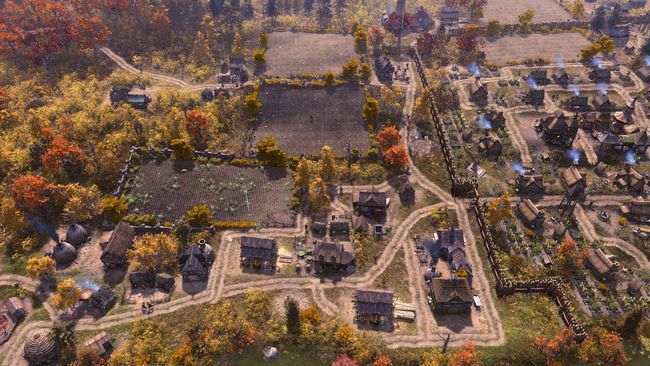Table of Contents Show
Beginner’s explanation as well as tips and tricks for Storage in Crate Entertainment’s Farthest Frontier.
Storage guide and tips
This guide is meant to show new players the basics of the storage system in Farthest Frontier, as well as some tips and tricks for optimizing storage and removing the headache of spoilage / long travel times.
This reading is mainly targeted toward new players or players that are having trouble understanding or optimizing the storage in their town(s).
As with any Early Access game, all of this information is subject to change, and I will be reading the patch notes to make sure this guide stays up to date to help you all out.
Anyways, lets get started.
Resources for Storing
Off the bat, you don’t have access to all of the resources as most of them are locked behind production from buildings in the later tiers. But you will have access to plenty of the raw materials to stock before much of the production begins.
Raw Materials
Resources that are gathered from the world and not refined in any way, there resources are later used in many ways to produce other materials.

For example: Wood, Stone, Iron, Herbs, etc.
Food
Arguably the most important at any stage in the game, includes both raw and refined variations, proper storage will be crucial as most of your food items can spoil, some at a slower rate than others.

For example: Meat, Fish, Berries, Bread, etc.
Produced Materials
Materials that are produced or refined from the Raw Materials listed prior, these are crucial to building and upgrading your town as well as producing more specific items.

For example: Planks, Firewood, Bricks, Flour, etc.
Usable Items
The last category is essentially the final production stage for any of your materials, these items are used by your workers to survive / gather and produce more resources.

For example: Clothing, Tools, Beer, Soap, etc.
Storage Buildings
For the most part, you have access to all of the storage options at the beginning, at the moment though you are required to build them in order.
Storage cart
The first storage building you get in the game as you start, it has a low – moderate storage capacity but will store anything and is mobile meaning that you can move it anywhere by clicking the wheel icon.
It is effective for early game storage, but especially effective for storing building materials, as you can simply move the cart closer to a construction / upgrade site so your workers don’t have to travel as far to gather from it.

Use for: Early game storage / Raw Materials / Usable Items
Don’t use for: Food / Raw Materials (Later Game)
Stockyard
The Stockyard is pretty well the same as the Storage Cart, except it offers slightly more storage space at the cost of it being immobile.
It is effective for early game storage, should be used for storing building / raw materials. Just mind the placement of the building if you plan to use it for this, apparently there is a mechanic for resource weight, workers will move slower with certain raw materials as they weigh more.

Use for: Raw / Produced Materials
Don’t use for: Food
Root Cellar
The Root Cellar is a small storage building that can only store food items and some herbs.
It is highly effective for storing food, and should be the only option for doing so as it wards off food spoilage, especially when upgraded

Use for: Everything Perishable (Mainly Food / Herbs)
Don’t use for: n/a
Storehouse
The Storehouse is the largest storage building of the bunch
It is effective for early game storage, should be used for storing building / raw materials. Just mind the placement of the building if you plan to use it for this, apparently there is a mechanic for resource weight, workers will move slower with certain raw materials as they weigh more.

Use for: Raw Materials / Produced Materials / Usable Items
Don’t use for: Food Storage (Unless you don’t have a Root Cellar yet)
Storage Tips & Optimisation
There are a couple ways you can optimise your storage to make it work more effectively, I will continue to add to and change the information this section as updates release / more tips are found.
Assigning Storage
You can assign storage pretty simply to each building by clicking the checkbox in the top left corner of each resource to turn storage on or off at the given building.

I already touched on this in the buildings section, but I will list storage recommendations for each building below. Simply uncheck everything except what is listed below for each building.
- Storage Cart: Use Early Game | Raw Materials and Usable Items
- Stockyard: Raw Material and Produced Materials
- Root Cellar: Everything it can store (Mainly Food and Herbs)
- Storehouse: Raw Materials, Produced Materials and Usable Items
Storage Locations
The location of your Storage Locations in relation to your production and distribution is important, as too much travel time reduces productivity, this is especially important for food.
Its pretty simple, just place your storage somewhere in the middle of your production and distribution as shown in the picture below. If it can’t be right in the middle, try to make it slightly closer to production to keep your production numbers up, distribution should follow.

Closing (for now)
This was a pretty basic guide overall, I know.
As stated before it is directed at those new to the game or the genre as a whole, the guide will get longer as time goes on, I will continue to update it as the game evolves and or I find more stuff to make known!
